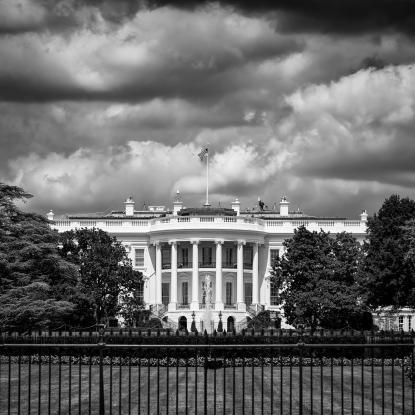
Exposing President Trump’s Pay-to-Play Administration

President Donald Trump has made it clear that favorable treatment from his administration is readily available — for a price.
This pay-to-play relationship is a defining feature of how Trump’s second administration is operating, by embracing unprecedented levels of unabashed political corruption. Multimillion dollar checks get political donors appointed to the presidential Cabinet; seven-figure corporate donations are rewarded with support for legislative and policy positions; and hefty inaugural fund donations make federal investigations disappear.
Campaign Legal Center has compiled over three dozen of the most egregious examples — a list that unfortunately continues to grow — of wealthy individuals, companies, special interest groups and foreign governments that have contributed to Trump’s political and financial interests and received generous official favors in return. We also put forth legal and policy solutions that can stop this from happening, both now and in the future.
► View Campaign Legal Center’s Tracker on Pay-to-Play Corruption in the Trump Administration
Six Different Ways Trump Is Awarding His Benefactors
Thanks to major flaws in our campaign finance system, there are already numerous pathways for special interests to channel their wealth to the political candidates of their choosing.
When that sea of money flows into an administration that blatantly disregards campaign finance and ethics laws, along with longstanding ethical norms, the resulting corruption raises concerns not only about the exploitation of elected office for personal and political gain, but also about the unprecedented power of wealthy special interests to steer the federal government to best serve their goals — at the expense of everyday Americans.
Our research has identified six key areas where individuals or entities received favors or appointments in return for their financial support:
- 1. Cabinet or Senior Executive Branch Appointments. Some of the wealthiest members on this list cut seven-figure checks to Trump-affiliated PACs during the 2024 election or to the presidential inaugural fund — a well-known conduit for dark money — in the weeks after Trump secured reelection. The president appointed many of these benefactors to some of the most powerful roles in government.
- 2. Ambassadorships. After making seven-figure contributions to Trump’s presidential campaign or inaugural fund, Trump announced his intent to nominate several ultra-wealthy donors to key ambassadorships, regardless of their lack of qualifications to serve in these important positions.
- 3. Pardons and Commutations. Individuals convicted of or serving time for serious crimes received preferential treatment after making political donations to Trump, effectively purchasing a “get out of jail free” card.
- 4. Dropped Cases and Investigations. The Trump administration has been quick to drop federal cases and investigations aimed at his big corporate donors, despite the possibility that these corporations were potentially breaking the law and harming consumers.
- 5. Perks and Promises for Corporations. Industries lined up to win favor with Trump in the days after the election, with companies and CEOs alike spending millions to secure the administration’s support for policies that would impact their financial interests.
- 6. Favor for Foreign Governments. Foreign governments are spending billions of dollars — in cash, investments or a new plane — to secure a favorable position in negotiations with Trump’s administration.
Campaign Legal Center’s exhaustive research can be seen in the full Trump’s Corrupt Transactions tracker.
Reforming Our System to Return Power to the American People
The list of favors compiled by CLC draws an ominous picture of the current state of our democracy: The president openly abuses the power of his office in exchange for money, and the framework of laws and ethical norms that Americans rely on to protect our democracy is failing to stop him.
To restore accountability and prevent a future president from betraying the public trust in this way, we must enact stronger ethics rules and campaign finance laws that ensure our government serves the public — not the highest bidder.
We're calling for:
- 1. A law requiring that presidents must divest from their financial interests or place them in a blind trust upon assuming office, so companies and countries can no longer curry the president’s favor through support for his business ventures.
- 2. New ethics guidelines that ensure ambassadorial nominees are qualified and ready to serve the public’s best interests, including a Certificate of Competency.
- 3. New campaign finance laws that prevent wealthy special interests from pouring millions into outside entities like inaugural funds or presidential library funds, which can essentially become unregulated slush funds. Several of the companies and individuals listed in the tracker won their political favor through seven-figure donations to Trump’s presidential library fund or inaugural fund.
- 4. Stronger, well-enforced anti-coordination laws that prevent political candidates and parties from working behind the scenes with special interest-funded super PACs that can raise and spend unlimited sums of money on elections — provided that spending is genuinely independent of candidates and parties.
- 5. Reforming the Federal Election Commission (FEC) to return it to its original mission: a truly independent agency willing to enforce campaign finance laws and protect voters’ constitutional rights.
- 6. An overhaul of the money-in-politics system created by the 2010 Supreme Court decision Citizens United v. FEC, which relied on a deeply flawed assumption that the massive spending unleashed by the decision would be fully transparent and independent and would not pose a risk of corrupting candidates or elected officials.
At Campaign Legal Center, we’ve devoted more than 20 years to dismantling the nexus between the ultra-wealthy and our elected officials, from advancing reforms at the state level to get dark money out of local elections to defending federal campaign finance laws at the Supreme Court.
We’re not stopping now. We will continue to research and catalog every instance of future pay-to-play actions to hold this administration accountable to the American people and shine a light on how special interests are influencing the government. Check back regularly as this tracker is updated.